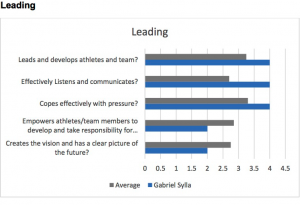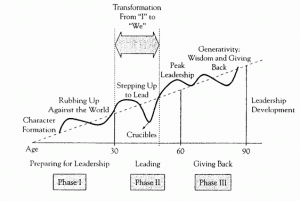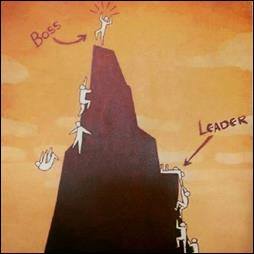
Becoming an effective leader
Some are natural born leaders, but, it takes time to build an effective leader.
An effective leader must be able to comunicate with ease first and foremost, and if one wants to share or sell their vision and have individuals buy into it, they have to be convincing, genuwine. You also have to be able to handle and minimize “resistance to change” and that takes skills.
•Jim Collins – From good to great and the social sectors (2006)
•Leading change ljohn P Kotter, 1996
It takes phases to build a leader, and if one of the following steps is skipped, you could be having trouble being an effective leader:

George, B. (2007) True North, Jossey-Bass.
My reflection on leadership since i have joined this program has led me to this important thought: ” a leader must big confident enough to surround himself with people who are better than him” i have been on many coaching staffs over the past 20 years and i have seen leaders getting rid of staff members just because they were better than them in certain areas. This should be true in many domains but specially “sport martial art federations”. The martial arts world is very hierarchical and a master in his “dojo” is never challenged and he is the supreme ruler, so the problem is when the same “people” want to run a sport federation they tend to do the same thing and forget that they are not in their dojos. They have a hard time changing leadership styles and that creates all kinds of frictions are personality conflicts! leadership is all about communication and bringing people to share your vision. By feeling implicated and empowered athletes and staff will be inspired by your message.

Public speaking is the number one Phobia in North America? The second greatest fear is death! it is among the findings of the Chapman University Survey on American Fears (2016) In highSchool that was a big issue for me, I used to even go to the point of having panic attacks while trying to speak in front of the entire class.I never thought i would be the leader that i’m today. i certainly never thought i would be able to coach or train national team athletes either.I overcame this fear by teaching karate, to kids. These kids made me step outside of my comfort zone without knowing it and made me feel like a super hero, I used to have the nick name: “Black Dragon” ! In 2002, I worked for a company that used to specialize in kids animation “Caméléon Animation”, if i wanted to keep my job i had to overcome my fears.
In a span of 8 years I taught karate in over 20 schools, in the same period I was also teaching adults in dojos, and than i started training athletes and discovered my true calling. I owe a lot to these kids, because they were natural, they made me forget my FEARS (specially the fear of being judged) and focus on fun and karate.

After all these years of coaching, going through the advanced coaching diploma and having the opportunity to reflect on my coaching through the high performance coaching and technical leadership program through the NCCP core competencies, i’m now in a position today to mentor younger coaches, so i want to imagine mentoring a younger version of myself and this is the advice and basic principles i would give him about being an effective leader:
• Be genuine
•Do not be afraid to take risks
• Develop a solid coaching philosophy
• Find a mentor
• Never compromise on your core values
• Know your topic before speaking publicly. The more you understand and care about your subject and the more you care about the topic, the less likely you’ll make a mistake or get off track and have a panic attack
• Find a non judgmental audience to practice:
This will put you at ease, and help build your confidence
• Get organized. Ahead of time, carefully plan out the information you want to present, know you cues by heart, Preparation is key
• Film yourself, and analyze the video, do it over andover until you are at ease and learn from your coaching mistakes
• Visualize your success. Imagine that your speach or message will go well. Positive thoughts will help decrease some of your anxiety about your social performance and relieve that unnecessary stress.
• Focus on your message and your passion, not on your audience.
• Don’t be afraid of a moment of silence. If you lose track of what you’re saying or you begin to feel nervous and your mind goes blank, it can seem like you’ve stopped talking for an eternity. Use humour…(in good taste)
• Doing things seriously without taking yourself so seriously.
•Inspire and empower people around you
• Learn to say “NO” sometimes (take care of your self)
In conclusion after reflecting the concept of leadership, i think that leadership is driven by energy and a leader has to manage 4 types of energies in order to be efficient
Ø1- Spirituel: vision, mission, core values and ethics
Ø2- Mental: Direction of attention, perspicacity and attitude
Ø3- Émotionnel: Communication, Optimism and courage while facing adversity/problems, Favouring positive emotions
Ø4- Physique «Walk the talk» and lead by exemple, Coherence between saying it and doing it
Thank you for reading me, please do not hesitate to comment or give your opinions on the subject
Gabriel
Hi Gabriel,
Genuine is the word that comes to mind so strongly in all your presentations and insights. This is so powerful. I am sure you will never know just what an effect it has on those around you.
It is interesting to thing of the ‘black dragon’ afraid to speak in front of group. We are such a funny and fragile and wonderful creation. We all struggle to become who we are meant to be even if we can not see who we will become. You have transformed from a young man with anxiety about speaking in front of people to a man who most certainly must captivate the room when presenting.
I love the graphic of the development of leadership.. It is not a short game… a long apprenticeship and journey is needed to gain the wisdom and humility to be a master leader and influencer. You are well on your way.
Mike Robinson
https://blogs.ubc.ca/coachmike/
Gabriel I like how you have summarized many of the leadership characteristics that relate to your leadership. I was also intrigued by your own personal pathway toward leadership and overcoming fears. Based on the phases of leadership graphic, it would have been interesting to see how you own leadership development aligned to the different phases of leadership. I would challenge that there may be different leadership pathways and lines depending on the context in which we engage others. Leadership within our family may be different than the leadership in our coaching, or in other positions where people are placed into a leadership role.
The other tough thing about leadership is that it is hard to define. That’s why researchers spend a lot of time theorizing about different categories of leadership and then try to gather evidence of the categories. My simple analogy is that leadership is like the air we breath; we can’t often see it, however we know if it smells bad or good. In other words leadership that smells bad give feelings of discomfort where as leadership that smells good gives comfort. I think that is why coaching in such a great profession, because the very act of coaching is leading.
I often wonder, however whether one can lead, but fail at leadership. I have seen this on many occasions in the sport system where there is a lack of systematic approach. Think of a a crowded harbour of ships where none will be able to move unless there is a systematic approach to allow each ship to embark on its voyage. Each ship likely has a leader, but lacks the channel that will get them to where they want to be. Hence, we could have fantastically equipped cruise ships that serve great food, have fun activities and likely perform very well, however the ship never really goes anywhere – and never leaves the harbour. Okay, the metaphor is intentional, and challenges the difference between leading and leadership. Life is full of leaders, but it is really exceptional leadership that truly guides people to new and different destinations. The ship is the vessel that enables the leader to get people to a better destination. Are you on the Transformational Ship, Transactional Ship, Dictator Ship, or Servant ship. Which ship do you captain?
Thank you Dave i see myself as transformational type of captain, i really like the metaphor.
What i love the most out of coaching is to see the transformation, the growth of the athlete
or younger coach i’m in charge of. Witnessing that growth gives me so much joy and pride nothing
comes even close! Inspiration is the key to taking that ship sailing across the waters drifting on an ocean
of knowledge wisdom and self-discovery!I inspire by displaying my passion and leading by exemple, by keeping
Myself in the best physical form possible, by having impeccable work ethics and by not being afraid to take risks and sometimes
making mistakes, admitting them, learning from them and moving on. I ‘m now at 51 years old and 25 years of coaching in phase 3
Of the leadership chart: Giving back! But phase one and specially phase two were very difficult phases for me personally
I started phase one as an assistant coach in our dojo while i was still competing. I had something to prove, and i wasn’t doing
things for the right reasons and that is why i was always in conflict with the older athletes(who were just a few years younger that i was)
My head coach led a dictator ship and i wanted to be like him.Thinking about it today,i realize it was not necessary. I was looking for respect and admiration for all the wrong reasons and it backfired many times.
As i started to accumulate the NCCP certifications, i matured as young coach and started adjusting my coaching style and became more of a transactional leader but i was still a little cocky and started butting heads with the chief instructor in the club because he didn’t have the NCCP level that i had. He didn’t like the new ideas i wanted to apply, and he was starting to feel insecure.
That was the wrong approach for me again, the message started to go through with the athletes but my relationship with the head master went from bad to worst, and i eventually had to leave… Than i met Gerard Lauzière the most qualified karate coach in Quebec and in Canada at the time. Not only was he qualified but he was a good coach the best i ever had as an athlete. As aspiring elite level coach, i started to observe him and discovered the service coach, he was there for the athlete, he made you feel great about yourself as an athlete and a staff member. We all had great success at nationals when he was at the helm with Germain Bisson an other great Coach.
A few years later he gave me my first chance as an assistant coach on the provincial team and became a mentor ever since. Today, i chose him as a mentor for this program, it was an easy choice. After the growing pains of phase one and phase two of my leadership latter, the transition to the third phase of my career was smooth thanks to the leadership and mentoring of Gerad. I was inspired and i vowed to make any athlete i coach feel like he made me feel as an athlete and a young coach. I started to help empower athlete and staff around me and that is the direction i chose to follow ever since.
Gabriel, great response to my comment.. Awesome reflection.